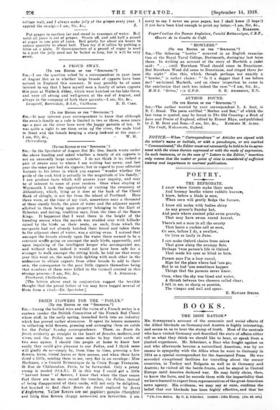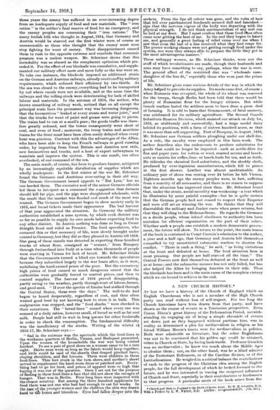BOOKS•
THE IRON RATION.*
MR. SCHREINER'S account of the economic and social effects of the Allied blockade on Germany and Austria is highly interesting. and seems to us to bear the stamp of truth. Most of the neutrals who have visited Germany and described the state of affairs either tell us what they think we should like to hear, or speak from a limited experience. Mr. Schreiner, a Boer who fought against us and who afterwards became a naturalized American, was by no means in sympathy with the Allies when he went to Germany in 1914 as a special correspondent for the Associated Press. He was accorded exceptional facilities for travelling about the enemy countries, in Turkey and Bulgaria as well as in Germany And Austria; he visited all the battle-fronts, and he stayed in Central Europe until America declared war. He may fairly claim, then, to know the facts, and he records them with the impartiality that we have learned to expert from representatives of the great American news agency. His evidence, we may say at once, confirms the belief .that our blockade has been highly effective, and that for • The Iron Ration. By G. A, SChrelner, Loudon : John Iturray. [1.08.1d. net.] three years -the enemy has suffered in an ever-increasing, degree from an inadequate supply of food and raw materials. The " iron
ration " is the soldier's final reserve of food for an emergency, and the enemy peoples are consuming their " iron rations. The many foolish folk who thought in August, 1914, that Germany and Austria would be starved out the first winter were of course as unreasonable as those who thought that the enemy must soon stop fighting for want of money. Their disappointment caused them to ruih to the opposite extreme and conclude that economic pressure was a useless weapon. Mr. Schreiner shows that this incredulity was as absurd as the complacent optimism which pre- ceded it. For the effect of our blockade was cumulative, and supple- mented our military effort more and more fully as the war went on. To take one instance, the blockade imposed an additional strain
on the German and Austrian railways, already overtaxed by military requirements, which reduced their efficiency by two-thirds. As the sea was closed to the enemy, everything had to be transported by rail where canals were not available, and at the same time the railways and the rolling-stock were deteriorating for lack of skilled labour and materials. In the autumn of 1916, the author, who knows something of railway work, noticed that on all except the principal main lines the permanent way was becoming dangerous, that the locomotives " leaked at every steam and water joint," and that the trucks for want of paint and grease were going to pieces. The trains had to run at a snail's pace ; the goods traffic was there- fore greatly reduced, and the towns consequently went short of coal, and even of food ; moreover, the troop trains and munition trains for the front must have been often sorely delayed when every hour was precious. Contrast with this the advantages of the Allies, who have been able to keep the FrenCh railways in good running order, by importing from Great Britain and America new rails, new locomotives and trucks, and a host of expert railwaymen to maintain and improve the system. This is one result, too often overlooked, of our command of the sea.
The main result, of course, has been to produce famine, mitigated by an increasingly equitable distribution of supplies which are wholly inadequate. In the first winter of the war Mr. Schreiner found the Germans and Austrians over-eating in their old way. The German Government issued appeals to " Eat Less," but no one heeded them. The excessive zeal of the minor German officials led them to interpret as a command the suggestion that -farmers should kill fat pigs, and the pigs were slaughtered wholesale, with the result that the market was flooded and much of the meat was wasted. The German Government began to show anxiety early in 1915, and bread tickets made their appearance The had harvest of that year aggravated the situation. In Germany the military authorities established a zone system, by which each district was as far as possible to supply its own needs before exporting food to any other district. In Austria nothing was done so long as Count Sturgkh lived and ruled as Premier. The food speculators, who cornered this or that necessary of life, were slowly brought under control in Germany, but they did as they pleased in Austria till 1916. One gang of these rascals was detected in exporting three hundred trucks of wheat flour, consigned as " cement," from Hungary through Switzerland into Italy at a time when thousands of people were starving in Vienna for lack of bread. Mr. Schreiner thinks that the Governments turned a blind eye towards the speculators because they subscribed largely to the war loans after, as it were, mobilizing the hard-earned pence of the poor. But the excessively high prices of food caused so much dangerous unrest that the authorities were gradually forced to control prices, and then to control supplies. The harvest of 1916 proved disappointing, partly owing to the weather, partly through want of labour,horses, and good seed. " If ever the spectre of famine had stalked through the Central States, these were the days." The well-to-do had begun to hoard desperately, regardless of cost, and thus often wasted good food by not 'Plowing how to store it in bulk. This malpractice was stopped, and the " food sharks " were checked in their extortions. The " bread-lines " ceased when every one was assured of a daily ration, however small, of bread as well as fat and milk. People had still to wait in long queues for other foodstuffs in order to check the consumption. The fundamental difficulty was the insufficiency of the stocks. Writing of the winter of 1916-17, Mr. Schreiner says :—
" Sad in the extreme was the spectacle which the food-lines in the workman quarters of Berlin, Vienna, and Budapest presented. Upon the women of the households the war was being visited hardest. To see a pair of good shoes on a woman came to be a rare sight. Skirts were worn as long as the fabric would keep together, and little could be said of the shawls that draped pinched faces, eloping shoulders, and flat breasts. There were children in those food-lines. Thin feet stuck in the torn shoes, and mother's shawl served to supplement the hard-worn dress or patched suit. Every- thing had to go for food, and prices of apparel were so high that buying it was out of the question. Once I set out for the purpose of finding in these food-lines a face that did not show the ravages of hunger. That was in Berlin. Four long lines were inspected with the closest scrutiny. But among the three hundred applicants for food there was not one who had had enough to eat for weeks. In the COdie tithe younger women and the children the skin was drawn hard to the bOneli and bloodless. Eyes had fallen deeper into the sockets. From the lips all colour was gone, and the tufts of hair that fell over parclunented foreheads seemed dull and famished— sign that the nervous vigour of the body was departing with the physical strength. I do not think sentimentalism of any sort can be laid at my door. But I must confess that these food-Mies often came near getting the best of me. In the end they began to haunt me, and generally a great feeling of relief came over me when I saw that even the last of a line received what they had come for. The poorer working classes were not getting enough food under the system, nor were they always able to prepare the little they got in the most advantageous manner."
These unhappy women, as Mr. Schreiner thinks, were not the stuff of which revolutionists are made, though their husbands and sons may have something to say, perhaps, when the war is over. The general effect of the restricted diet was " wholesale man- slaughter of the less fit," especially those who were past the prime of life.
Mr. Schreiner gives some curious details of the way in which the Army helped to provide-its supplies. Its needs came first, of course ; when Rumania was occupied, the whole of its wheat was reserved for the troops, though Berlin had been told that there would be plenty of Rumanian flour for the hungry citizens. But while trench warfare lasted the soldiers seem to have done a great deal of farming. It is odd to learn that Gommecourt, of fatal memory, was celebrated for its military agriculture. The Second Guards Substitute-Reserve Division, which resisted our attack on July 1st, 1916, so stubbornly and successfully, had a large model dairy behind its positions, with a farm of sixteen hundred acres, so that it was more than self-supporting. East of Bucquoy, in August, 1918, Mr. Schreiner saw German soldiers ploughing under our shell-fire. As a rule, the cavalry were employed in this farm-work. The author describes also the endeavours to produce substitutes for goods- that could no longer be imported—such as nettle-fibre for flee and paper yarn for cotton or wool, roasted acorns and beech- nuts or carrots for coffee, lime- or beech-buds for tea, and so forth. He ridicules the chemical food-substitutes, and the shoddy cloth, produced by over-ingenious manufacturers, which fell to pieces at the first shower. Leather was almost unobtainable. An ordinary pair of shoes was costing over £4 before he left Vienna. Eighteen months ago the enemy peoples were, in fact, suffering from a scarcity of all necessaries, and there is no reason to suppose that the situation has improved since then. Mr. Schreiner found that, under the strain, social morality was weakening—a text which he illustrates by some painful examples—but he is quite certain that the German people had not ceased to respect their Emperor and were still set on winning the war. He thinks that they will disestablish the military and Junker caste when peace returns, but that they will cling to the Hohenzollern. He regards the Germans as a docile people, whose inbred obedience to authority has been mistaken for efficient organization on the part of their rulers. Whether such a people can establish a modern democratic govern- ment, the future will show. To return to the point, the main lesson of the book is contained in Count Czernin's admission to the author, a year and a half ago, that Germany and Austria felt themselves compelled to try unrestricted submarine warfare to shorten the conflict. " There is such a thing," he said, " es being victorious at the front and defeated at home. The food situation here is most pressing. Our people are half-starved all the time." The Central Powers now find themselves defeated at the front as well as at home ; and the submarine menace has not only failed, but has also helped the Allies by bringing America to their side. Thus the blockade has been and is the main cause of the complete victory which we are bound to achieve in the end.



























 Previous page
Previous page